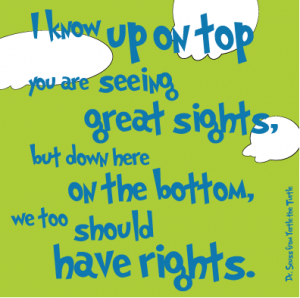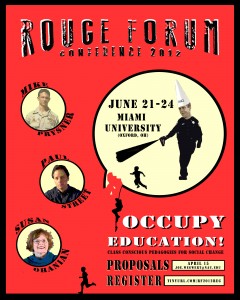Last month I gave the keynote address at the Ninth International Conference on Research in Teaching of Social Sciences at the Autonomous University of Barcelona (Spain). Organized by GREDICS (Research Group on the Teaching of Social Sciences) this year’s conference theme was “The Formation of Social Thought and the Construction of Democracy in the Teaching of Social Science, Geography, and History.”
While in Barcelona, I also had the pleasure of participating, along with social studies researchers from Colombia, France, and Brazil, in two seminars for the students and faculty at AUB, which focused on recent topics of and methods for conducting research in social studies, geography, and history education.
My talk, titled “Social Control and the Pursuit of Dangerous Citizenship”, can be streamed online here (translated to Catalan).
The PowerPoint presentation of my talk is available in English, Spanish, and Catalan.
The abstract of my talk follows:
Social Control and the Pursuit of Dangerous Citizenship
Yes, citizenship—above all in a society like ours, of such authoritarian and racially, sexually, and class-based discriminatory traditions—is really an invention, a political production. In this sense, one who suffers any [or all] of the discriminations…does not enjoy the full exercise of citizenship as a peaceful and recognized right. On the contrary, it is a right to be reached and whose conquest makes democracy grow substantively. Citizenship implies freedom…Citizenship is not obtained by chance: It is a construction that, never finished, demands we fight for it. It demands commitment, political clarity, coherence, decision. For this reason a democratic education cannot be realized apart from an education of and for citizenship. (Paulo Freire, Teachers as Cultural Workers, p. 90)
The nature of citizenship and the meanings of citizenship education are complex, as are their multiple and contradictory implications for contemporary schooling and everyday life. The issues citizenship education presents are critical and inexorably linked to the present and future status of public schooling and the maintenance, strengthening, and expansion of individual and democratic rights.
In his classic book Democracy and Education (1916), John Dewey opens with a discussion of the way in which all societies use education as a means of social control. Dewey argues that education as a social process and function has no definite meaning until we define the kind of society we have in mind. In other words, there is no “objective” answer to questions about the means and ends of citizenship education, because those purposes are not things that can be discovered.
In Normative Discourse, Paul Taylor (1961) succinctly states a maxim that has the potential to transform our approach to the civics, citizenship education and the whole of the social studies curriculum: “We must decide what ought to be the case. We cannot discover what ought to be the case by investigating what is the case” (p. 278). We—educators and citizens—must decide what ought to be the purpose of citizenship education. That means asking what kind of society, what kind of and world we want to live in and then taking action to make it a reality. And, in particular, in what sense of democracy do we want this to be a democratic society? In order to construct meaning for civics and citizenship education, we must engage these questions not as merely abstract or rhetorical, but in relation to our lived experiences and our professional practice as educators.
Not surprisingly then civics and citizenship education—which is generally accepted as the primary purpose the social studies education—has always been a highly contested curricular area. The tapestry of topics, methods, and aims we know as social studies education has always contained threads of social reconstructionism. Social reconstructionists in the USA, such as George S. Counts, Harold Rugg, and later Theodore Brameld argued that teachers should work toward social change by teaching students to practice democratic principles, collective responsibility, and social and economic justice. Dewey advocated the democratic reconstruction of society and aspects of his philosophy inform the work of some aspects of citizenship education. The traditional patterns of social studies teaching, curriculum, and teacher education, however, reflect little of the social reconstructionist vision of the future, and current practices in these areas are more often focused on implementing standardized curriculum and responding to high-stakes tests than developing and working toward a vision of a socially just world. Indeed, the self-described social studies “contrarians” in the USA who advocate the “transmission” of “facts” and reject pluralism in favor of nationalism and monculturalism seem to be have the upper hand in most schools and classrooms, despite spirited resistance.
Undoubtedly, good intentions undergird citizenship education programs in North American. And yet, too often their oppressive possibilities overwhelm and subsume their potential for anti-oppression and anti-oppressive education, especially as states, the national government, and professional education associations continue their drive to standardize, to impose a singular theory and practice of curriculum, instruction, and assessment.
Social studies educators must pursue, as some already do, an agenda dedicated to the creation of a citizenship education that struggles against and disrupts inequalities and oppression. Classroom practice must work toward a citizenship education committed to exploring and affecting the contingencies of understanding and action and the possibilities of eradicating exploitation, marginalization, powerlessness, cultural imperialism, and violence in both schools and society. Freire, as illustrated in the above quotation, like Dewey, teaches us that citizenship education is essential to democratic education, and that democratic education is essential to a free and democratic society. Students must know that birth, nationality, documents, and platitudes are not enough. They must understand that the promises of citizenship (freedom), the fulfillment of its virtues, are unfinished, and that they remain an ongoing, dynamic struggle. And they must come to act in a variety of creative and ethical ways, for the expansion and realization of freedom and democracy, the root of contemporary notions of citizenship, is in their hands, and it demands of them no less than the ultimate in democratic and anti-oppressive human reflection and human activity.
Contemporary conditions demand an anti-oppressive citizenship education, one that takes seriously social and economic inequalities and oppression that result from neoliberal capitalism and that builds upon the anti-oppressive possibilities of established and officially sanctioned approaches. Some new and potentially exciting directions and alternatives exist, however, within the recent scholarship surrounding Freirean and neo-Freirean pedagogy, democratic education, and cultural studies.
The pedagogical power “dangerous citizenship”, which I explore in the balance of this paper, resides in its capacity to encourage students and educators to challenge the implications of their own education/instruction, to envision an education that is free and democratic to the core, and to interrogate and uncover their own well-intentioned complicity in the conditions within which various cultural texts and practices appear, especially to the extent that oppressive conditions create oppressive cultural practices, and vice versa.

 Follow
Follow

